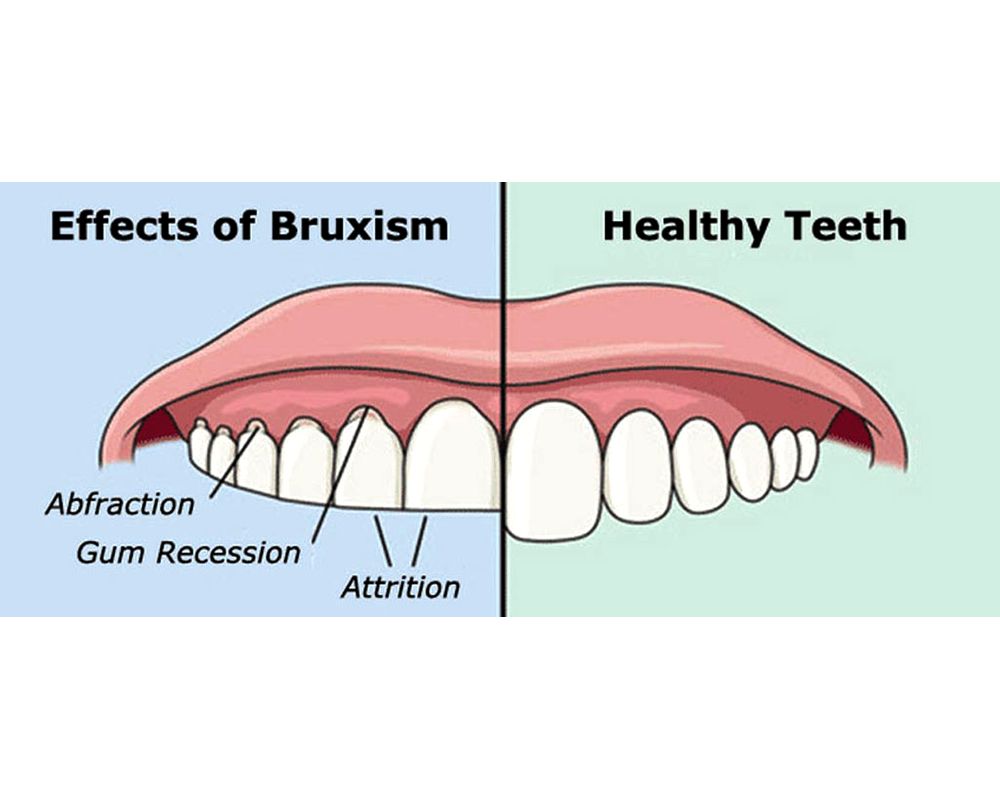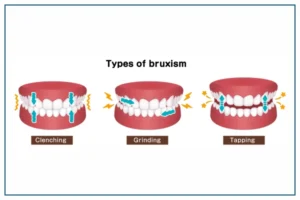Introduction
Bruxism, commonly known as teeth grinding, is a dental condition that affects a significant number of individuals. At Krishees Dental Hospital, we understand the impact of bruxism on oral health and overall well-being. In this comprehensive guide, we explore the causes, symptoms, and effective treatments for bruxism, providing valuable insights into maintaining optimal dental health.
Types of Bruxism
Bruxism, the involuntary grinding or clenching of teeth, presents itself in various forms, each with distinct characteristics and potential causes. Understanding the different types of bruxism is crucial for accurate diagnosis and effective treatment. At Krishees Dental Hospital, our experts delve into these variations to provide personalized care tailored to each patient’s unique condition.


Nocturnal Bruxism
Definition:
Nocturnal bruxism occurs predominantly during sleep, and individuals often remain unaware of this unconscious habit.
Common Signs:
Morning headaches
Jaw pain upon waking
Tooth sensitivity
Potential Causes:
Stress and anxiety
Malocclusion (improper alignment of teeth)
Diurnal Bruxism
Definition:
Diurnal bruxism, also known as daytime bruxism, involves teeth grinding or clenching that occurs while a person is awake.
Common Signs:
Jaw soreness during the day
Increased tooth sensitivity
Facial muscle tension
Potential Causes:
Stressful work environments
Habitual clenching during tasks
Primary Bruxism
Definition:
Primary bruxism is not associated with any other medical condition, and its origins often remain idiopathic.
Common Signs:
Wear patterns on teeth
Disrupted sleep patterns
Headaches
Potential Causes:
Genetics
Sleep-related factors
Secondary Bruxism
Definition:
Secondary bruxism is linked to an underlying medical or psychological condition, often requiring a multidisciplinary approach for effective management.
Common Signs:
Teeth damage
Temporomandibular Joint (TMJ) disorders
Chronic pain in jaw and face
Potential Causes:
Medication side effects
Neurological conditions
Occlusal Bruxism
Definition:
Occlusal bruxism involves the grinding or clenching of teeth due to irregularities in tooth alignment, impacting the bite.
Common Signs:
Uneven tooth wear
TMJ pain
Chipped or fractured teeth
Potential Causes:
Malocclusion
Previous dental work complications


Causes of Bruxism
Stress and Anxiety
One of the leading causes of bruxism is stress and anxiety. Understanding the connection between mental well-being and teeth grinding is crucial for effective treatment.
Malocclusion
Misaligned teeth, known as malocclusion, can contribute to bruxism. Krishees Dental Hospital employs advanced diagnostic tools to identify and address issues related to tooth alignment.
Lifestyle Factors
Certain lifestyle factors, such as excessive alcohol consumption or smoking, may contribute to bruxism. Exploring these factors is essential for creating tailored treatment plans.
Symptoms of Bruxism
Tooth Sensitivity
Patients often experience increased tooth sensitivity as a result of bruxism. We delve into the reasons behind this symptom and discuss strategies for relief.
Jaw Pain and Headaches
Persistent jaw pain and headaches are common indicators of bruxism. Our guide provides detailed information on how Krishees Dental Hospital addresses these symptoms through personalized treatment approaches.
Wear and Tear on Teeth
Bruxism can lead to significant wear and tear on teeth. We explore the dental implications and showcase preventive measures and restorative treatments available at our hospital.
The Consequences of Untreated Bruxism
Dental Damage
Examine the potential harm bruxism can cause to teeth and oral structures.
Impact on Overall Health
Unveil the broader health implications associated with untreated bruxism.
Innovative Treatments Offered at Krishees Dental Hospital
Custom Mouthguards
Explore the creation and benefits of personalized mouthguards for bruxism patients.
Stress Management Techniques
Understand the role of stress in bruxism and learn stress management strategies provided by Krishees.
Dental Rehabilitation
Delve into the comprehensive dental care plans for bruxism patients, including restorative procedures.
Holistic Approaches to Bruxism Care
Integrating Wellness
Learn how Krishees Dental Hospital combines traditional dentistry with holistic well-being practices.
Nutrition for Oral Health
Explore dietary recommendations aimed at supporting oral health and preventing bruxism.
Patient Success Stories
Real-Life Transformations
Read inspiring narratives of individuals who successfully conquered bruxism with Krishees’ treatment.
Testimonials
Explore testimonials from patients who have experienced the quality care provided at Krishees Dental Hospital.
Choosing Krishees Dental Hospital for Bruxism Treatment
Expertise of the Dental Team
Meet the skilled professionals at Krishees and their expertise in treating bruxism.
State-of-the-Art Facilities
Discover the advanced facilities and technologies used for bruxism diagnosis and treatment.
Conclusion
At Krishees Dental Hospital in kukatpally, our commitment to providing holistic and personalized bruxism treatment is unwavering. By addressing the causes and symptoms through innovative solutions, we strive to enhance not only dental health but overall quality of life.
FAQs
Q1: Can bruxism be completely cured?
A1: While there isn’t a definitive cure, effective treatments can manage and alleviate bruxism symptoms.
Q2: How long do I need to use a mouthguard for bruxism?
A2: The duration varies but consistent use, especially during sleep, is crucial for optimal results.
Q3: Are children prone to bruxism?
A3: Yes, children can experience bruxism, often due to factors like misaligned teeth or stress.
Q4: Can stress management really help with bruxism?
A4: Yes, addressing stress is a key component of successful bruxism treatment.
Q5: Are there alternative treatments besides mouthguards?
A5: Depending on the cause, orthodontic interventions and stress management techniques are explored as alternatives.

Leave a Reply